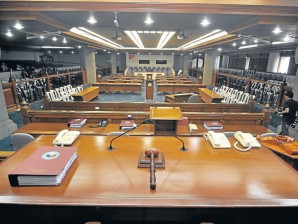MANILA, Philippines—The Senate on Monday afternoon passed a bill postponing the Sangguniang Kabataan (youth council) elections originally scheduled to coincide with the barangay (village) elections on Oct. 28.
With 19 voting for and one abstaining, the senators approved on third and final reading Senate Bill No. 1186 postponing the SK elections.
Sen. Vicente Sotto III abstained from voting because he was opposed to Section 2 of the bill, which allows current SK officials to remain in office until their successors are elected.
“I expect that Section 2 will be fully discussed in the bicameral conference,’’ Sotto said.
Senate President Franklin Drilon said the chamber would immediately proceed to the bicameral conference committee so the conflicting versions of the measure could be reconciled before Congress breaks on Sept. 28.
“Since the elections will be on Oct. 28, we have no more time because we will be back on Oct. 13,” Drilon said.
Sen. Ferdinand Marcos Jr., chair of the committee on local government and sponsor of the bill, said that since the elections in 1992, the SK has not been as effective as “envisioned in advancing the democratic ideals of service-oriented youth leadership.”
He said there were reports that the SK leaders had become too politicized and susceptible to dishonest practices in handling public funds.
“As a result, there are strong clamors from different sectors of society calling for the restructuring and in-depth evaluation of the SK, and institute reforms,” Marcos said.
The National Youth Commission has adopted Resolution No. 18 in support of the postponement of the October 2013 SK elections to allow lawmakers to craft substantial reforms before the voting for new SK officials.
Marcos said that if the SK elections this October are postponed, the terms of the incumbent SK officials would effectively be extended.
Marcos said the consensus in the hearings was that reforms had to be put in place before SK elections could be held.
“There is a holdover provision in the local government code regarding that matter,” he had said.
